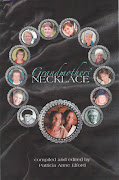Our ‘on-the–page’ voice must match our ‘real-life’ voice if we want our writing to have an authentic ring to it was the advice Charles Foran emphatically drove home to a WCDR breafast last week in Ajax. Winner of The 2011 Charles Taylor Prize for “Mordecai: The Life and Times”, his biography of Mordecai Richler, he illustrated his message with remarks and readings from his book of essays, "Join the Revolution, Comrades" and with stories and readings from his biography of Richler.
Since then, I have been thinking about my voice and wondering just what it is? I have a soft voice that wouldn’t project when I was in the drama club at Northview Collegiate. I have a quietly intelligent voice. I have a thoughtful voice. I have an inquiring voice. I don’t speak without thinking. I’m not quick to draw attention or promote myself. On the page, I lean towards a more journalistic style, listing facts and documenting my points. Is it only an inviting engaging voice that entices the reader to go on? Do you have to be an Irish story-teller to captivate an audience?
A challenge Charles didn’t address was how to capture my child’s voice, maybe age 6 or 7 and then grow myself up to the concluding chapters of my memoir. How do I move my voice along as I change? I know I did change. My effervescent child’s voice was stifled in adolescence. I became shy and introverted. Then I gradually reasserted myself. Can change be shown by picking several points along my timeline to illustrate the differences? What do you think?
Any thoughts on voice?
Subscribe to:
Post Comments (Atom)







4 comments:
Hi Ruth,
You have posed a very challenging and universal question that all memoirist face. I think any writing we do has to come from the heart and when we are recapturing our childhood experiences,it is crucial that we stay in that child's voice. You seem very aware of how those experiences affected you, so focusing on the feelings generated by those experiences may help. Awareness of how my childhood memories feel has helped me. Also, I have found observing children of the age I am focusing on to be helpful. Of course ,it does help that I have seven grandsons ages 2-8 and I work as a nurse practitioner in a pediatric office:-) You make an important point about authenicity which leads to honoring "our truths"- the greatest challenge.
I have more questions than answers but you certainly have me thinking here.And your links are great. Thanks for a thought-provoking post.
Write On!
Hi Kathleen,
Yes, I raised more questions than I answered in this post. I think voice is the key to writing a memoir that invites readers. A unique voice can capture even reluctant critics of plot and character. Your suggestions for:
(1) getting into the head of a child by observation and (2) dropping down to the feelings the events generated instead of just concentrating on the events are excellent! It's amazing what a large story can be told using very little action or events. Thanks for commenting.
Hi, Ruth,
How interesting your question about "What is My Voice?" I have been wondering that about myself for a very long time. I am finally finding that I have a voice - a voice that I didn't know existed.
What I enjoy most about my written voice is the freedom in it. The opportunity to express quietly and loudly at the same time. I enjoy expressing the authenic self, the deep philisophical voice that usually only comes out in my writing. It is freeing, really, to have this voice, to share my voice in a world that does not always listen otherwise. To take the time to gather thought, ponder questions and share.
In healing my past hurts I have tried many things, however, I found the best way was through visualisation of myself at different stages in life and approaching her as an adult - this practice may be helpful in capturing yourself through the years because you are able to reaquaint yourself with the younger versions of yourself. It's quite an experience if you can manage it.
P.S. I enjoyed meeting you at the WCDR breakfast on the 9th.
Hi Shiela,
Thanks for stopping by and commenting. I also enjoyed meeting you at the WCDR breakfast. I am happy you have found an outlet for your voice through writing your memoir. The more confident you become in your authenic voice the more it will come out in other real life situations. I like your comments about healing but for me in writing my memoir, I need to alternate between the child's voice of the story and the adult me reflecting on my experience with adult wisdom, expressed in an artful way.
Post a Comment